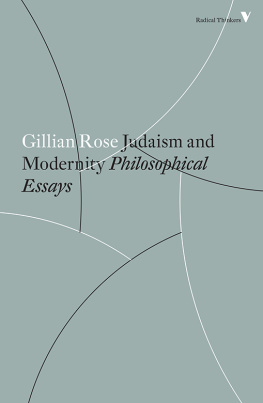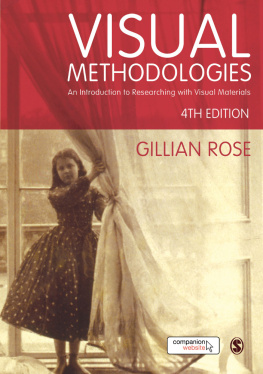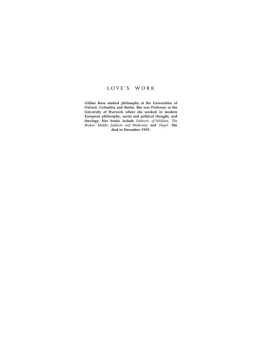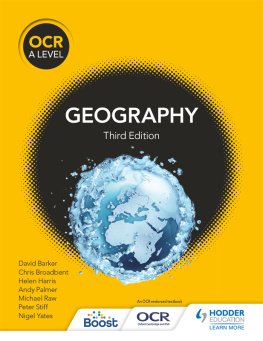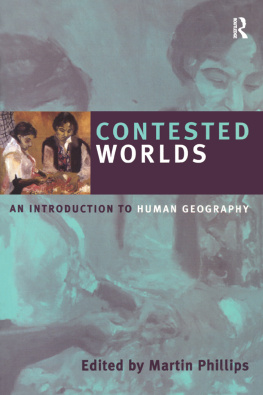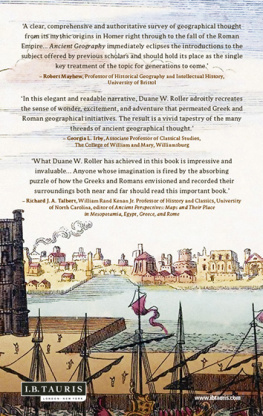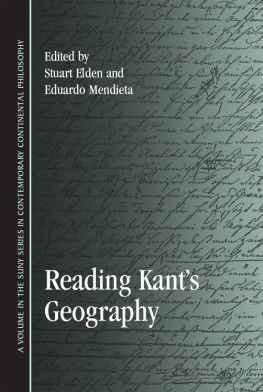FEMINISM AND GEOGRAPHY
The Limits of Geographical Knowledge
GILLIAN ROSE
Polity Press
Copyright Gillian Rose, 1993
The right of Gillian Rose to be identified as author of this work has been asserted in accordance with the Copyright, Designs and Patents Act 1988.
First published in 1993 by Polity Press in association with Blackwell Publishers Ltd
Reprinted 1996,2004,2007
Polity Press
65 Bridge Street
Cambridge CB2 1UR, UK
Polity Press
350 Main Street
Maiden, MA 02148, USA
All rights reserved. Except for the quotation of short passages for the purposes of criticism and review, no part of this publication may be reproduced, stored in a retrieval system, or transmitted, in any form or by any means, electronic, mechanical, photocopying, recording or otherwise, without the prior permission of the publisher.
Except in the United States of America, this book is sold subject to the condition that it shall not, by way of trade or otherwise, be lent, re-sold, hired out, or otherwise circulated without the publishers prior consent in any form of binding or cover other than that in which it is published and without a similar condition including this condition being imposed on the subsequent purchaser.
ISBN: 978-0-7456-6844-4 (Single user eBook)
A CIP catalogue record for this book is available from the British Library.
Typeset in 10 on 12 pt Times
by Best-set Typesetting Ltd., Hong Kong
Printed and bound in Great Britain by
Marston Book Services Limited, Oxford
This book is printed on acid-free paper
For further information on Polity, visit our website: www.polity.co.uk
CONTENTS
ACKNOWLEDGEMENTS
Many people have helped me to write this book. I cant name everyone individually here, but to all Im deeply grateful. Meetings of the Women and Geography Study Group of the Institute of British Geographers first made it seem possible to me that I could write in the academy. The Geography Workshop reading group in London, which frequently debates issues of power and discourse, made a project like this seem important and helped me to formulate my critique. Seminars in Bristol, Cambridge, Edinburgh, Lampeter, London, Oxford and Southampton have heard some of the arguments made here, and Id like to thank their participants for their comments and suggestions. Liz Bondi, Steve Daniels, Felix Driver, Sue Ford, Louise Johnson, Michael Keith, Linda McDowell, Sarah Radcliffe, Nigel Thrift and Margaret Whitford read versions of various chapters; their comments have been invaluable. Discussions with students taking my course in Cultural Geography at Queen Mary and Westfield College helped me to write chapter 5; Peter Sunley was also very helpful. Jan Penrose gave good advice when it was sorely needed. Im grateful to my department at Queen Mary and Westfield College for a study leave term. Finally, I especially want to thank Steve Pile and Ann Taket, both of whom read the manuscript in full and talked with me about it in detail. With friends and colleagues like these, all errors of interpretation must remain mine alone.
Illustration 1 is reproduced with permission from D. N. Parkes and N. J. Thrift. Times, Spaces and Places: a Chronogeographic Perspective (John Wiley, Chichester, 1980), p. 252. Illustration 2 is reproduced by courtesy of the Trustees, The National Gallery, London. Illustration 3 is taken from Underweysing der Messung (Nuremburg, 1538).
Gillian Rose
London
LIST OF ILLUSTRATIONS
1 An example of a time-geography diagram.
2 Mr and Mrs Andrews, by Thomas Gainsborough.
3 A Draughtsman Drawing a Nude, by Albrecht Durer.
FEMINISM AND GEOGRAPHY: AN INTRODUCTION
The academic discipline of geography has historically been dominated by men, perhaps more so than any other human science. In the UK, the Royal Geographical Society refused, with a few rare exceptions, to elect women as fellows until 1913. Between 1921 and 1971, a mere 2.6 per cent of papers in the Annals of the Association of American Geographers were written by women; in Economic Geography the figure was 6.0 per cent. In 1973, 12.3 per cent of members of the Association of American Geographers were women, and in institutions offering higher degrees in geography in the USA and Canada only 3.1 per cent of regular staff members were female.
Feminist geographers have long argued that the domination of the discipline by men has serious consequences both for what counts as legitimate geographical knowledge and who can produce such knowledge. They have insisted that geography holds a series of unstated assumptions about what men and women do, and that the discipline concentrates on the spaces, places and landscapes that it sees as mens. The preponderance of men in the discipline not only results in women not being studied by academic geographers, then, but also in too few women academics in geography.
Open criticism of womens under-representation in geography began to be published in the disciplines journals in the early 1970s. According to Zelinsky, the timing of this discussion can be attributed to the slightly belated impact on geography of the liberation movements of the late 1960s, including the civil rights movement and feminism. and I will not repeat them here. Instead, I focus on rather a different issue: why contemporary human geography continues to be so resistant to work on and by women.
For feminism remains outside the project of geography.
To me, this deep reluctance to listen to feminism and to its focus on women, not to mention the continuing under-representation of women in the discipline, suggest a more fundamental resistance to women as subjects and authors of geographical knowledge than simply the fact that women are assumed to be interested in different issues from men. In fact, as Liz Bondi remarked in a recent review of feminist geography, It seems to me that womens exclusion is not only a question of the themes of research, nor even of the new concepts with which feminists work to organize those themes, but rather a question related to the very nature of hegemonic geographical knowledge itself. I suspect that there is something in the very claim to knowing thought in geography which tends to exclude women as producers of knowledge, as well as what are seen as womens issues as objects of knowledge. So in this book I explore the possibility that it is the specific notion of knowledge through which geographers think that marginalizes women in the discipline.
I argue that to think geography to think within the parameters of the discipline in order to create geographical knowledge acceptable to the discipline is to occupy a masculine subject position. Geography is masculinist. Masculinist is a term I have adopted from Michle Le Doeuff, who describes as masculinist work which, while claiming to be exhaustive, forgets about womens existence and concerns itself only with the position of men.
In exploring the masculinism of geography at some length, this is But to claim that geography is masculinist immediately raises two key questions. First, just how are the connections between masculinity, men, knowledge and power to be conceptualized? And, second, what does a particular theorization of those connections mean for feminist critiques? These are two themes of this book, and the next two sections introduce my arguments and explain how the following chapters will address them.
Masculinity, Men, Knowledge and Power
Feminists have made many different connections between masculinity, men, knowledge and power. To elaborate the masculinism of geography, I draw on a kind of feminism which, by developing certain arguments from poststructuralism and psychoanalysis, connects masculine subjectivity to powerful claims to know. I start with subjectivity because I want to insist on the social context and consequences of geographys claims to know: geographys epistemic exclusions are enacted by and impact on specific people. This section introduces my approach, and makes some preliminary connections between geographical knowledge and a particular form of masculinity.
Next page

